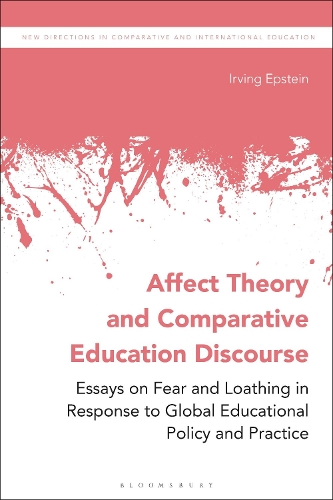
Affect Theory and Comparative Education Discourse: Essays on Fear and Loathing in Response to Global Educational Policy and Practice
(Paperback)
Publishing Details
Affect Theory and Comparative Education Discourse: Essays on Fear and Loathing in Response to Global Educational Policy and Practice
By (Author) Irving Epstein
Bloomsbury Publishing PLC
Bloomsbury Academic
28th January 2021
United Kingdom
Classifications
Tertiary Education
Non Fiction
Philosophy and theory of education
379
Physical Properties
Paperback
232
Width 156mm, Height 234mm
331g
Description
What does educational policy-making and institutional practice entail in an era of globalization Global interactions challenge conventional assumptions governing the certainty of geographical boundedness; simplistic notions of citizenship and identity; fixed notions of time, space and movement, and clear distinctions between economic modes of production and consumption. Irving Epstein argues that conventional educational institutions and the policies that support them tend to ignore such anxiety by affirming a belief in educational modernism to the exclusion of other possibilities. What is missing in most of these analyses is an appreciation for the role of affect in determining how our encounters with these practices become significant and how our efforts to find meaning in those policies and practices lead to their acceptance or rejection. This book is the first application of affect theory to comparative education themes and shows how it can help to form a more robust discussion of the policy-making process and the popular reactions to it. After discussing the key concepts associated with affect theory, he presents a total of six case studies. Three of the cases depict relationships between educational, cultural, and social organizations whose purposes conflict with one another but whose presence is indicative of a loss of faith in the efficacy of public schooling. Three of the cases are illustrative of an even greater systematic rejection of educational institutional aim and purpose.
Reviews
An exceptionally intelligent and readable analysis that questions the theoretical orientations dominant in comparative education research. The book proposes the use of affect theory to address how school practices fail to respect identity for children, families and communities. Through illuminating case studies, Epstein points toward a solution when he shows, for example, how extracurricular music programs build a connection between aesthetics and social justice. Other examples focus on questioning the universal claim that schools are safe spaces for children and youth by reviewing cases of school violence and youth protest in Chile, Spain, United States and Hong Kong. Affect Theory and Comparative Education Discourse makes a timely and important contribution to rethinking the dominant theoretical and methodological perspectives within the field of comparative and international education. * Regina Cortina, Professor of Education, Teachers College, Columbia University, USA *
A much-needed, beautifully written introduction to affect theory and its potential to in/trans/reform comparative education. Epsteins generous text provides comparative educators with a wide-ranging introduction to affect theory. He deftly shows how and why this body of approaches can (and, perhaps, must) complement current critical analyses of the global state of public education. Drawing together a remarkable range of theoristsfrom Baudrillard, Connell, Foucault, and Ranciere, to Bourdieu, Butler, Goffman, and MassumiEpsteins rhizomatic chapters thread together sites as diverse as Chilean cemeteries, Kenyan soccer fields, global arts NGOs, Spanish youth protests, South African bullying programs, and US universities under the world rankings regimes. In so doing, he provides a lyrical, sweeping, and powerful account of how analytic concepts like fear, loathing, memorializing, and sensibility may generate new insights about the contingencies and potentialitiesas opposed to the causes and consequencesof education policy and practice, here, there, and everywhere. * Nancy Kendall, Chair and Professor of Educational Policy Studies, University of Wisconsin-Madison, USA *
Author Bio
Irving Epstein is the Ben and Susan Rhodes Professor of Peace and Social Justice at Illinois Wesleyan University, USA, where he is Chair of the Department of Educational Studies and Director of the Center for Human Rights and Social Justice. Apart from Affect Theory and Comparative Education Discourse, he has published four books and over fifty journal articles and book chapters. In addition, he has served as an associate editor of the Comparative Education Review, and parliamentarian to the Board of Directors of the Comparative and International Education Society. He also is a longstanding member of the Board of Directors of the Scholars at Risk Network, an international organization of over 500 universities around the world, dedicated to protecting scholars in danger while promoting academic freedom advocacy.
